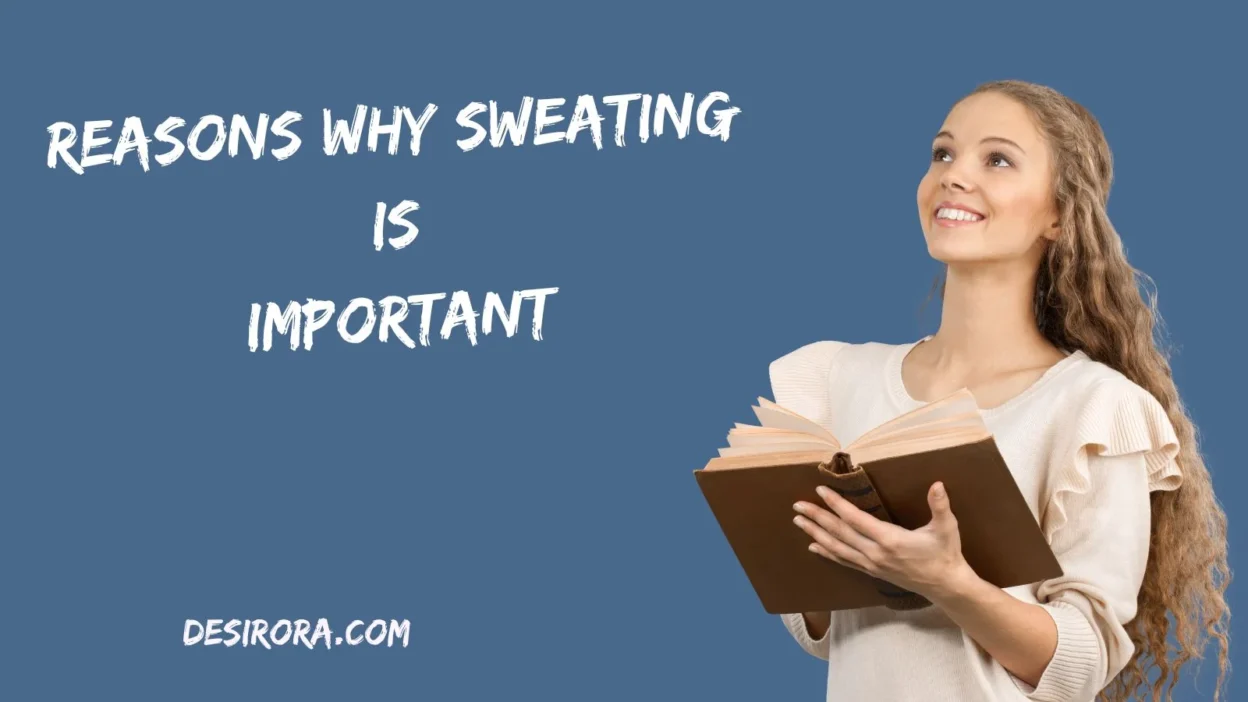Sweating often gets a bad rap—as messy, uncomfortable, or embarrassing. But in truth, it’s one of your body’s most essential and underappreciated processes. When you sweat, you’re not just “leaking water” — your body is working beautifully to keep you balanced and alive.
In this article, you’ll discover what sweating really does, why it matters, and how to make the most of it. You’ll also learn to separate fact from fiction when it comes to sweat myths, and know when your sweating may need medical attention.
How Sweating Works: The Science Behind Perspiration
Your skin is dotted with millions of sweat glands. Most are eccrine glands, which open directly onto your skin’s surface. A smaller number are apocrine glands, found around hair follicles in places like your underarms and groin.
When your internal temperature rises—due to exercise, heat, fever, or emotional stress—the hypothalamus (your body’s internal thermostat) signals sweat glands to activate. The eccrine glands release a mostly water-based fluid (with salts and trace minerals) onto the skin surface. As that fluid evaporates, it draws heat away and cools your body down.
Here’s a quick look at what’s in sweat:
| Component | Typical Amount | Function / Role |
| Water | About 99% | Main cooling agent |
| Sodium (Na) | 10–60 mmol/L | Nerve and muscle function |
| Potassium, Magnesium, Chloride | Trace | Electrolyte balance |
| Urea, Lactate, Ammonia | Small amounts | Minor waste removal |
Sweating is your body’s most powerful built-in cooling system. Let’s explore why that’s so important.
Thermoregulation: Your Body’s Cooling System
The number-one reason why sweating is important is thermoregulation—keeping your core temperature in a safe range.
Evaporative Cooling
When sweat evaporates from your skin, it takes heat with it. That’s your body’s main way of cooling off when air temperatures rise. Humans are especially good at this, which is why we can stay active longer than most mammals, even in hot conditions.
Preventing Heat Stress
If you can’t sweat enough—due to dehydration, blocked glands, or illness—your body overheats. That raises your risk of heat exhaustion or heat stroke.
Boosting Performance and Endurance
When your cooling system works well, your muscles can perform longer, and your brain stays sharper. That’s why athletes often train in hot environments: it helps their bodies become more efficient at sweating.
Detox, Waste, and Mineral Balance
There’s a popular belief that sweating “flushes out toxins.” The truth is a bit different.
Minor Role in Detox
Your kidneys and liver do the heavy lifting when it comes to detoxifying your body. Sweat removes only tiny amounts of urea, ammonia, and trace metals. So, while sweating does help excrete a few waste products, it’s not your main detox pathway.
Maintaining Electrolyte Balance
Sweat contains sodium, potassium, and other electrolytes. Heavy sweating can deplete these minerals, which can lead to cramps, fatigue, or dizziness if not replenished. That’s why athletes often drink electrolyte-rich fluids.
Healthy Stress Response
Heat exposure and sweating trigger mild stress that strengthens your body’s defenses. This process—called hormesis—helps activate repair enzymes and makes your cells more resilient over time.
Skin and Microbiome Benefits of Sweating
Your skin loves a healthy sweat session.
Supports Skin Hydration
Sweat helps hydrate the outer layer of skin and supports its natural barrier. When sweating functions properly, your skin stays smoother and less prone to dryness.
Unclogs Pores
When you sweat, pores open and flush out trapped dirt and oils. Sweat even contains natural antimicrobial peptides that help kill certain bacteria.
Balances the Skin Microbiome
Sweating helps maintain a healthy balance of bacteria on your skin. A balanced microbiome strengthens your skin’s defense against infections.
The “Post-Sweat Glow”
That refreshed, glowing look after exercise? It’s real. Increased blood flow brings oxygen and nutrients to skin cells, leaving your complexion radiant.
Mood, Brain, and Heart Health Benefits
Sweating is not just physical—it’s deeply connected to mental and emotional wellness.
Reduces Stress and Boosts Mood
When you sweat through exercise or heat therapy, your brain releases endorphins, dopamine, and serotonin—natural mood boosters. Many people notice they feel calmer and clearer after a good sweat session.
Sharpens Cognitive Function
Regular sweating through physical activity improves blood circulation to the brain. That helps sharpen focus, improve memory, and slow cognitive aging.
Supports Heart Health
Sweating from exercise or sauna use can mimic some effects of cardio workouts: your heart rate rises, blood vessels expand, and circulation improves. Over time, this helps strengthen your cardiovascular system.
Metabolic Benefits
While sweating itself doesn’t burn fat, the activities that make you sweat—like running, cycling, or hot yoga—definitely support calorie burn and metabolism.
Types of Sweat Glands
| Gland Type | Where It’s Found | Stimulus | Fluid Type | Purpose |
| Eccrine | All over body | Heat, activity | Watery | Cooling and thermoregulation |
| Apocrine | Underarms, groin | Emotional stress | Thick, fatty | Related to scent and stress response |
| Apoeccrine | In some individuals | Mixed triggers | Intermediate | A hybrid of both |
Thermal vs Emotional Sweating
- Thermal sweating happens when you’re hot or exercising.
- Emotional sweating appears during stress or anxiety—like clammy hands before a big presentation.
People who exercise regularly often sweat more efficiently—their bodies start cooling sooner and more effectively.
Everyday Examples of Why Sweating Matters
After a Workout
That puddle of sweat on your gym mat isn’t gross—it’s proof your body is cooling itself, flushing pores, and releasing feel-good hormones.
During a Sauna Session
Sitting in a sauna for 15 minutes increases circulation, relaxes muscles, and helps reduce tension. It’s a controlled form of sweating that supports overall wellness.
Before a Public Speech
Nervous? Sweaty palms? That’s your body’s built-in emotional response preparing you for action. It’s part of your “fight or flight” system.
On a Hot Day
When you’re outdoors in high temperatures, sweating prevents overheating and helps you stay safe and functional.
Myths and Misconceptions About Sweating
Let’s bust a few common myths:
- Myth: Sweating removes all your body’s toxins.
Truth: It helps a little, but detox happens mostly through your liver and kidneys. - Myth: More sweat means you’re healthier.
Truth: Sweat rate varies widely between individuals—it’s not a sign of health by itself. - Myth: Sweating burns fat.
Truth: You lose water weight temporarily, but fat loss comes from calorie burn, not sweating. - Myth: Sweating is dirty.
Truth: Sweat itself is sterile. It’s bacteria on your skin that can cause odor afterward. - Myth: Only exercise causes sweating.
Truth: Emotions, temperature, and even spicy foods can make you sweat.
When Sweating Isn’t Working Right
Too Little Sweat (Hypohidrosis / Anhidrosis)
Some people sweat very little or not at all. This can be dangerous because your body can’t cool itself properly. Common causes include nerve damage, skin disorders, or certain medications.
Too Much Sweat (Hyperhidrosis)
Others sweat excessively, even at rest. While not dangerous, it can be socially uncomfortable. Treatments include topical antiperspirants, medications, or medical procedures to control overactive glands.
Warning Signs to Watch For
- Sudden changes in sweating pattern
- Night sweats
- Lack of sweat during exertion
- Sweating with chest pain or dizziness
If you notice any of these, consult your healthcare provider.
Tips for Healthy, Safe Sweating
Here’s how to enjoy the benefits of sweating safely:
Stay Hydrated
Drink water before, during, and after sweating. For long workouts or sauna sessions, consider drinks with electrolytes.
Start Slow
If you’re not used to heat or exercise, increase your exposure gradually. Your body will learn to regulate temperature more efficiently.
Keep Skin Clean
Always shower after heavy sweating to remove salt, oil, and bacteria that can clog pores.
Dress Smart
Wear loose, breathable fabrics that wick moisture away from your skin.
Avoid Overheating
Take breaks when you feel dizzy, weak, or lightheaded. Sweating is helpful—overheating is not.
Use Heat Therapies Wisely
Saunas, steam rooms, or hot yoga can be great, but listen to your body and don’t overdo it.
Conclusion
Sweating is far more than an inconvenience—it’s a built-in survival system. It keeps your body cool, protects your skin, supports emotional balance, and promotes overall health.
So the next time you find yourself dripping after a workout or on a hot day, remember: that sweat is your body’s way of saying, “I’ve got this.”
Embrace it. You’re not just sweating—you’re thriving.
Frequently Asked Questions
Q: Does sweating help you lose weight?
A: Only temporarily through water loss. Real fat loss happens through consistent exercise and diet.
Q: Is sweating good for your skin?
A: Yes. It helps flush out pores and balance the skin’s microbiome—but always wash afterward.
Q: Why do I sweat more than others?
A: Genetics, fitness level, hormones, and environment all play a role.
Q: Can sweating detoxify my body?
A: Only slightly. Your liver and kidneys do most of the detox work.
Q: Should I be worried if I don’t sweat much?
A: Yes. If you rarely sweat, even in heat, consult a doctor—it could signal a health issue.




